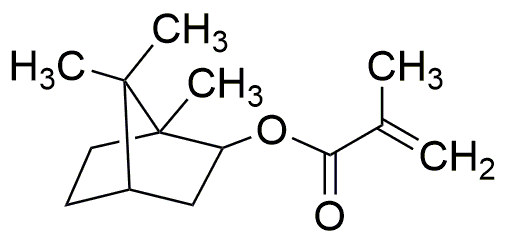Isobornyl methacrylate (stabilized with MEHQ) is widely utilized in research focused on:
- Adhesives and Sealants: This compound is often used in formulating high-performance adhesives due to its excellent bonding properties and resistance to environmental factors, making it ideal for construction and automotive applications.
- Coatings: Its incorporation in coatings provides enhanced durability and scratch resistance, which is particularly beneficial in the automotive and aerospace industries, where surface protection is crucial.
- Polymer Production: Isobornyl methacrylate serves as a monomer in the production of specialty polymers, contributing to materials with unique properties such as flexibility and thermal stability, suitable for electronics and medical devices.
- 3D Printing: In additive manufacturing, this compound is used to create resins that yield high-resolution prints with excellent mechanical properties, appealing to industries like prototyping and custom manufacturing.
- Cosmetics: It is also found in cosmetic formulations, providing a stable base for various products while enhancing their texture and application properties, making it popular in the beauty industry.
General Information
Properties
Safety and Regulations
Applications
Isobornyl methacrylate (stabilized with MEHQ) is widely utilized in research focused on:
- Adhesives and Sealants: This compound is often used in formulating high-performance adhesives due to its excellent bonding properties and resistance to environmental factors, making it ideal for construction and automotive applications.
- Coatings: Its incorporation in coatings provides enhanced durability and scratch resistance, which is particularly beneficial in the automotive and aerospace industries, where surface protection is crucial.
- Polymer Production: Isobornyl methacrylate serves as a monomer in the production of specialty polymers, contributing to materials with unique properties such as flexibility and thermal stability, suitable for electronics and medical devices.
- 3D Printing: In additive manufacturing, this compound is used to create resins that yield high-resolution prints with excellent mechanical properties, appealing to industries like prototyping and custom manufacturing.
- Cosmetics: It is also found in cosmetic formulations, providing a stable base for various products while enhancing their texture and application properties, making it popular in the beauty industry.
Documents
Safety Data Sheets (SDS)
The SDS provides comprehensive safety information on handling, storage, and disposal of the product.
Product Specification (PS)
The PS provides a comprehensive breakdown of the product’s properties, including chemical composition, physical state, purity, and storage requirements. It also details acceptable quality ranges and the product's intended applications.
Certificates of Analysis (COA)
Search for Certificates of Analysis (COA) by entering the products Lot Number. Lot and Batch Numbers can be found on a product’s label following the words ‘Lot’ or ‘Batch’.
*Catalog Number
*Lot Number
Certificates Of Origin (COO)
This COO confirms the country where the product was manufactured, and also details the materials and components used in it and whether it is derived from natural, synthetic, or other specific sources. This certificate may be required for customs, trade, and regulatory compliance.
*Catalog Number
*Lot Number
Safety Data Sheets (SDS)
The SDS provides comprehensive safety information on handling, storage, and disposal of the product.
DownloadProduct Specification (PS)
The PS provides a comprehensive breakdown of the product’s properties, including chemical composition, physical state, purity, and storage requirements. It also details acceptable quality ranges and the product's intended applications.
DownloadCertificates of Analysis (COA)
Search for Certificates of Analysis (COA) by entering the products Lot Number. Lot and Batch Numbers can be found on a product’s label following the words ‘Lot’ or ‘Batch’.
*Catalog Number
*Lot Number
Certificates Of Origin (COO)
This COO confirms the country where the product was manufactured, and also details the materials and components used in it and whether it is derived from natural, synthetic, or other specific sources. This certificate may be required for customs, trade, and regulatory compliance.


